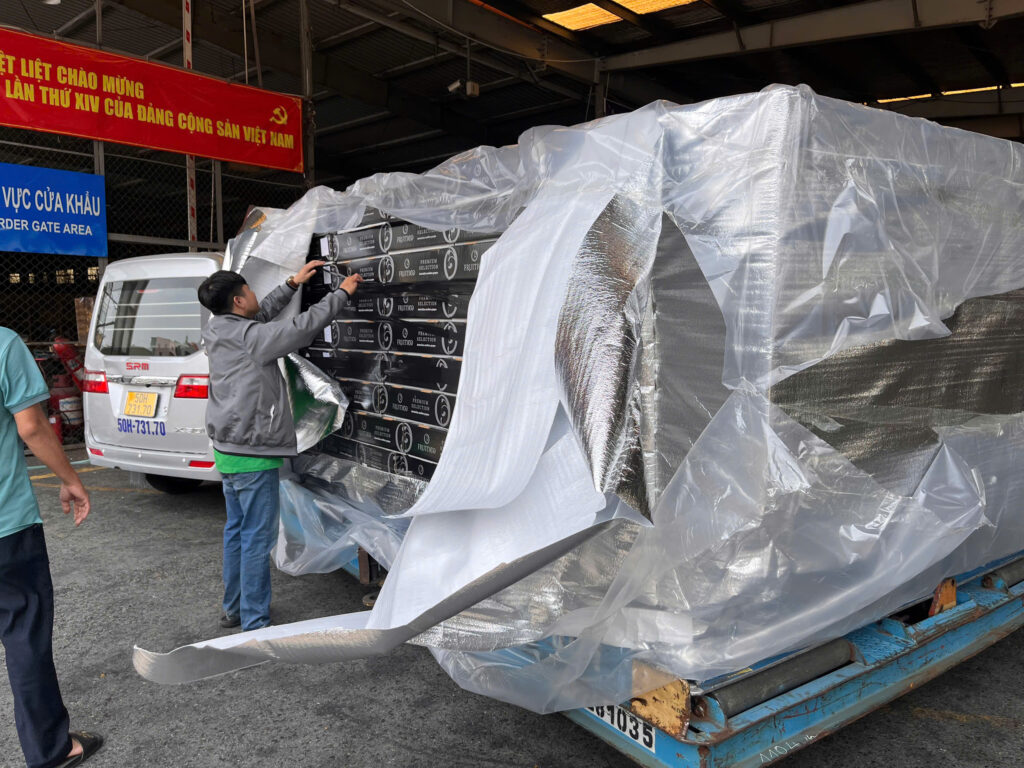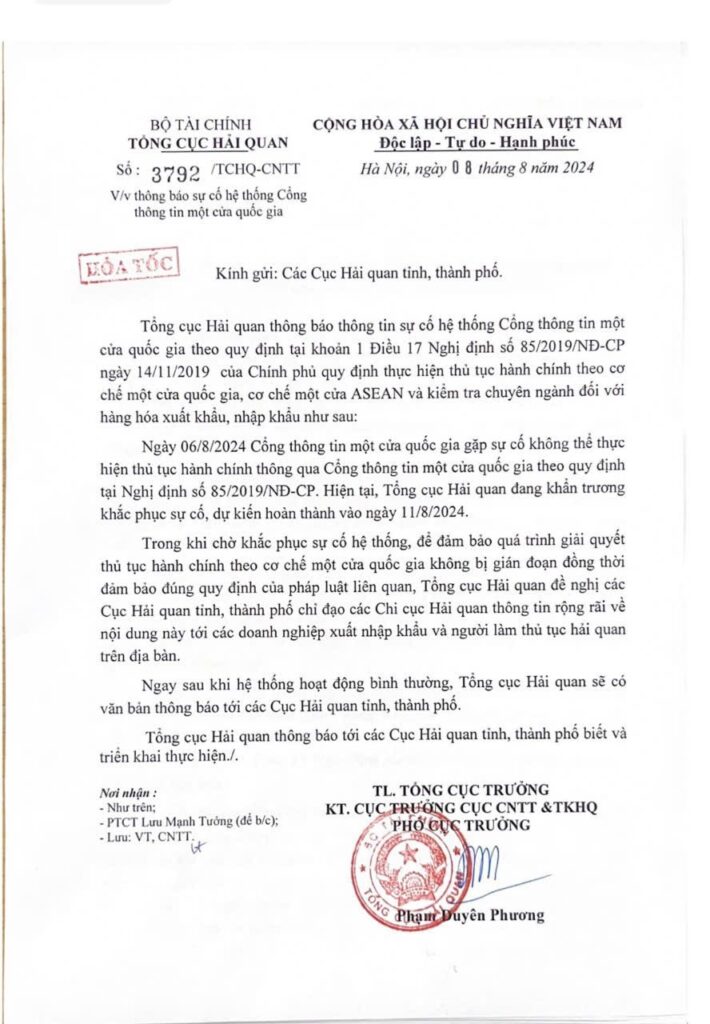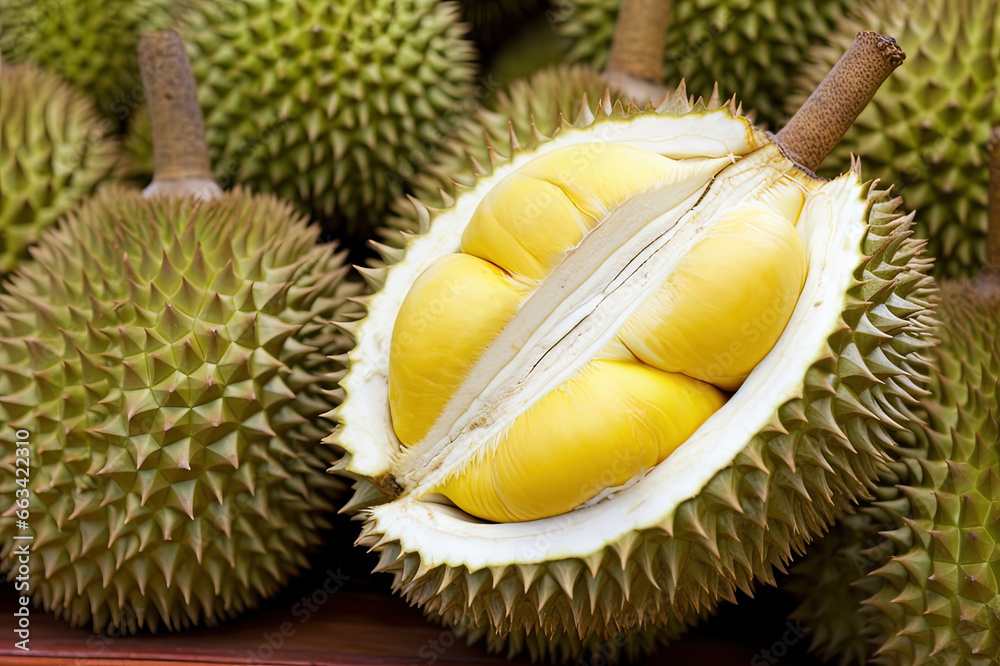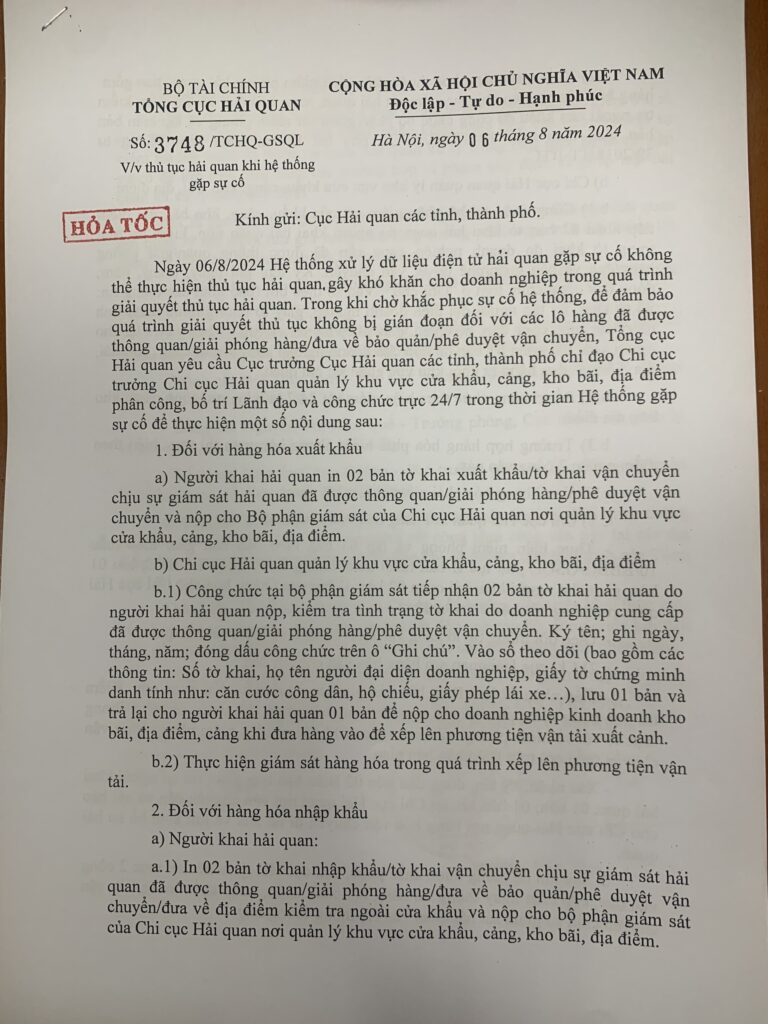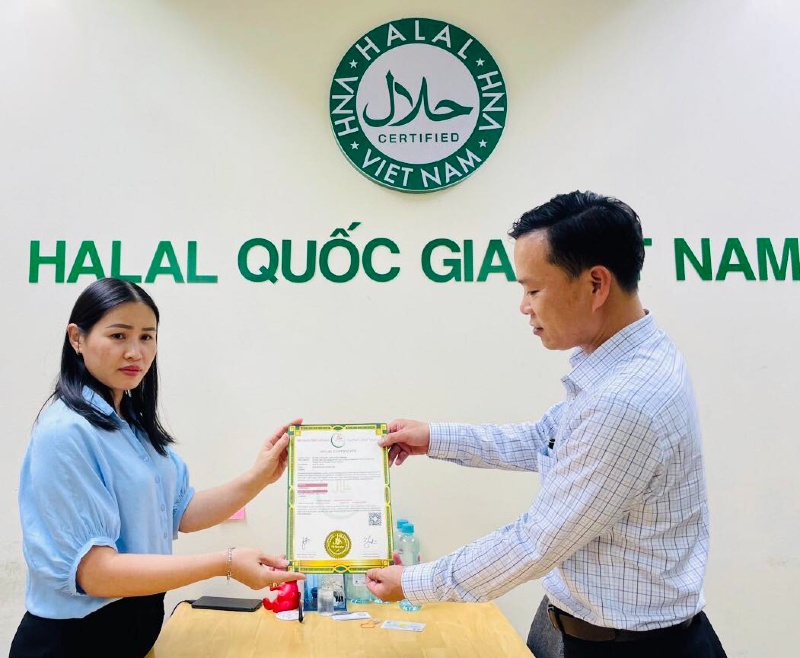1. What is GACC?
GACC (General Administration of Customs of China) is the agency responsible for managing all customs and international trade activities in China. To export goods to the Chinese market, businesses need to register and comply with GACC's new regulations.
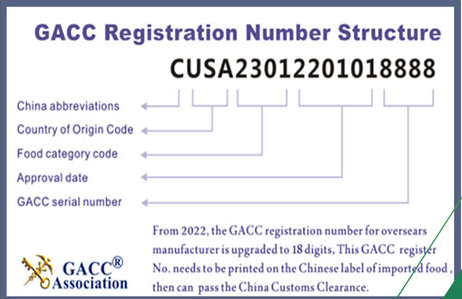
How to register to export to the Chinese market
2. New regulations on registration of exporting goods to China
New regulations on registration of exporting goods to China have been applied by GACC to ensure the safety and quality of goods. Businesses need to master these changes to avoid violations and ensure successful exports.
2.1 Regulations on 18 groups of export goods that must be registered
GACC Order 248 stipulates that the following products of plant origin must be registered before being exported to the Chinese market, including:
- Meat and meat products
- Gut shell
- Seafood products
- Milk Products
- Bird's nest and products from bird's nest
- Bee products, eggs and egg products
- Food fats and oils
- Flour
- Instant cereal
- Cereal flour and malt products
- Fresh and dried vegetables
- Dried beans
- Spice
- Nuts and seeds
- Dry fruit
- Unroasted coffee beans and cocoa beans
- Special nutritional food
- Functional foods
Note: For products that do not fall into the 18 categories mentioned above, you must submit your own registration documents or entrust an agent to carry out the registration.
2.2 Export conditions according to orders 248 and 249 of GACC
Order 248 “Regulations on registration and management of foreign imported food production enterprises”. Therefore, food and agricultural products will have to register for export codes (HS/CIQ codes) to meet orders 248 and 249 of the General Department of Customs of China GACC. China HS/CIQ code is available 13 numbers, including The 3 numbers are the CIQ code, this code is issued to 1 or more product groups, businesses, businesses rely on the code issued by China Customs to declare in the Customs declaration when declaring food imports into China and printing. Print the packaging and labels of the product.
Article 7 of Order 248 of the GACC stipulates that foods of plant origin must be registered through the Department of Protection Plants include:
- Cereals used for food: Refers to products from seeds, roots and tubers of plants such as cereals and potatoes, mainly including edible products from the seeds of herbaceous plants after processing raw, such as rice, oats and sorghum.
- Cereal powder products: Refers to fine powder products made from grinding and filtering seeds or roots and tubers of plants such as fruits, nuts, etc.
- Fresh vegetables, dehydrated vegetables and dried beans: fresh vegetables or dried vegetable products prepared by fresh keeping, dehydration, drying and other drying processes and dried beans.
- Spices of natural origin: Only natural plant products such as fruits, seeds, flowers, roots, stems, leaves, bark or whole plants, can be used directly with the functions of flavoring, flavoring and spice.
- Nuts and seeds: Nuts refer to the seeds of hard-shelled woody plants, including walnuts, chestnuts, apricot kernels, almonds, pecans, pistachios, torreya grandis nuts, and seeds. macadamia and pine nuts, ...
- Seeds refer to the seeds of plants such as melons, fruits, and vegetables including watermelon seeds and pumpkin seeds.
- Dried fruit: refers to fresh fruit products dried by sun-drying, drying and other dehydration processes
- Unroasted coffee beans and cocoa
Types of businesses registered under Order 248 and Order 249 include:
- CS production/processing enterprises;
- DS cold storage enterprise;
- Regular warehouse businesses
2.3 Basic information of note 353
Food Administration - General Administration of Customs of China GACC responds to the registration of foreign food production enterprises September 27, 2021:
- In the case of foreign manufacturing enterprises, registration must be introduced by the competent authority
- Foreign capacity enterprises register themselves
- About registration validity period
- Regarding the responsibilities of foreign manufacturing enterprises and foreign competent agencies
- List of food exporting enterprises;
- List of imported Foods with Trade;
- Sample letter of introduction for a Business Registered in China from a National and Territorial Authority
3. Registration documents for exporting goods to China
For registration documents to export goods to China, businesses need to prepare a number of documents such as business registration, export license, food hygiene and safety certificate (if applicable), contract. signed with a Chinese partner, designing packaging and packaging specifications for exported mangoes.
Types of documents required by GACC include:
- Certificate of business registration.
- Business commitment.
- Production diagram.
- The above documents must be signed and stamped according to regulations and accompanied by copies.
Documents required by the Plant Protection Department include:
- Certificate of facility meeting food safety conditions;
- Commitment to producing and trading safe agricultural, forestry and fishery foods; Good manufacturing practice certificate
- Hazard Analysis and Critical Control Point System Certificate (HACCP Certificate
- Food Safety Management System Certificate (ISO 22000 Certification)
- International food standard certificate;
- Global standard certificate for food safety;
- Food safety system certificate or other equivalent certificates.
- Explanation of eligibility to ensure food safety of the enterprise.
- Plant quarantine confirmation from the Provincial and City Plant Quarantine Agency according to management authority specified in Circular 35/2015/TT-BNNPTNT regulating domestic plant quarantine.
Note: All of the above documents need to be signed and stamped according to regulations and copies sent to the Plant Protection Department. If GACC has changes in registration requirements, the Plant Protection Department will adjust them. Adjust to suit the situation and notify businesses and registration units.
–> Contact Ms Trang: 0903712368 for free consultation.
4. Procedures for registering exports to the Chinese market
Procedures for registering exports to the Chinese market can be carried out directly at GACC or through authorized forwarding agents. Businesses need to ensure full information and valid documents to avoid being caught. refuse to register.
Step 1: Enterprise recommended Plant Protection Department Provide accounts for businesses by sending information in English via email qlattpmt.bvtv@mard.gov.vn same username and password proposed by the business.
Step 2: After receiving the enterprise's application, the Plant Protection Department will issue an account to the enterprise on the website. https://cifer.singlewindow.cn.
Step 3: Enterprises access the Website https://cifer.singlewindow.cn and use the account and password issued by the Plant Protection Department to register online to export food to China.
Step 4: Once the application is sent, the Plant Protection Department will check it and if it meets the requirements, it will be sent to GACC.
Step 5: Businesses must monitor the registration process and receive feedback from the Plant Protection Department as well as GACC directly on the Website.
5. Register for food export code to China
Registering a food export code to China is also an important step. Businesses need to comply with food safety regulations and meet requirements for quality and packaging of exported mangoes.
5.1 Subjects and scope of registration
Subjects registering export codes to the Chinese market according to Order 248 and Order 249 include:
- Food production and processing enterprises exporting to the Chinese market;
- Enterprises manufacturing and processing related to cold storage and preservation of food exported to the Chinese market;
- Businesses related to food storage Regular warehouses;
- Enterprises are on the List of 18 products according to Decree 15/2018/ND-CP dated February 2, 2018 of
- The Government provides detailed implementation regulations on the Food Safety Law;
- Enterprises that export food and agricultural products do not go through Vietnamese authorities.
Scope of export code registration under Order 248 and Order 249:
- Foods of plant origin;
- Foods of animal origin: Milk and dairy products, Meat and meat products, gut shells, bird's nest and bird's nest products, bee products, eggs and forest products;
- Foods derived from seafood;
- Foods including vegetable fats and oils, Foods processed with mixtures of flour, cereal foods, agricultural products of grain milling and malt;
- Special nutritional foods and functional foods

How to register to export to the Chinese market
5.2 Export code registration documents
– Letter of introduction from the competent authority of the country (region) where the headquarters is located;
– List of companies and company registration application;
– Documents proving business status, such as a business license issued by a competent authority of the country (region) where the business is headquartered;
– Declaration by the competent authority of the country (region) where the enterprise is headquartered to meet the requirements of this regulation;
– Verification report of the competent authority of the country (region) where the enterprise is headquartered on the inspection and approval of the relevant enterprise.
When necessary, the General Department of Customs may request documents on the company's safety, hygiene and food protection system, such as floor plans of the company's factory, workshop and cold storage, as well as process diagrams.
5.3 Procedures for registering export codes into China
Step 1: Enterprises identify competent Vietnamese agencies
Step 2: Register information with Vietnamese competent authorities
Step 3: Vietnamese competent authorities must come to inspect the enterprise, review and compare the enterprise's information and registration validity.
Step 4: Vietnamese competent authorities send a list of businesses and related documents to Chinese Customs through diplomatic channels.
Step 5: Chinese Customs conducts a review and comparison, receives registration, then provides codes to Vietnamese authorities or businesses.
Step 6: Businesses rely on codes issued by China Customs to print product packaging and labels.
For businesses that register themselves online with the Chinese Customs agency, they will follow 7 steps at the link. www.singlewindow.cn then completes the requests.
The validity of the export code will be 5 years. When registering for the food export code, the General Department of Customs will determine the start and end date of the code's validity period. Businesses must submit an application to renew their code 3 to 6 months before it expires. Once the registration requirements are met, the validity period of the registration will be extended by 5 years.
To be successful in registering to export to the Chinese market, businesses need to understand the new regulations, prepare complete documents, comply with the process and ensure product quality. With the right efforts and knowledge, businesses can expand their markets and increase sales.
–> Contact Ms Trang: 0903712368 for free consultation.

